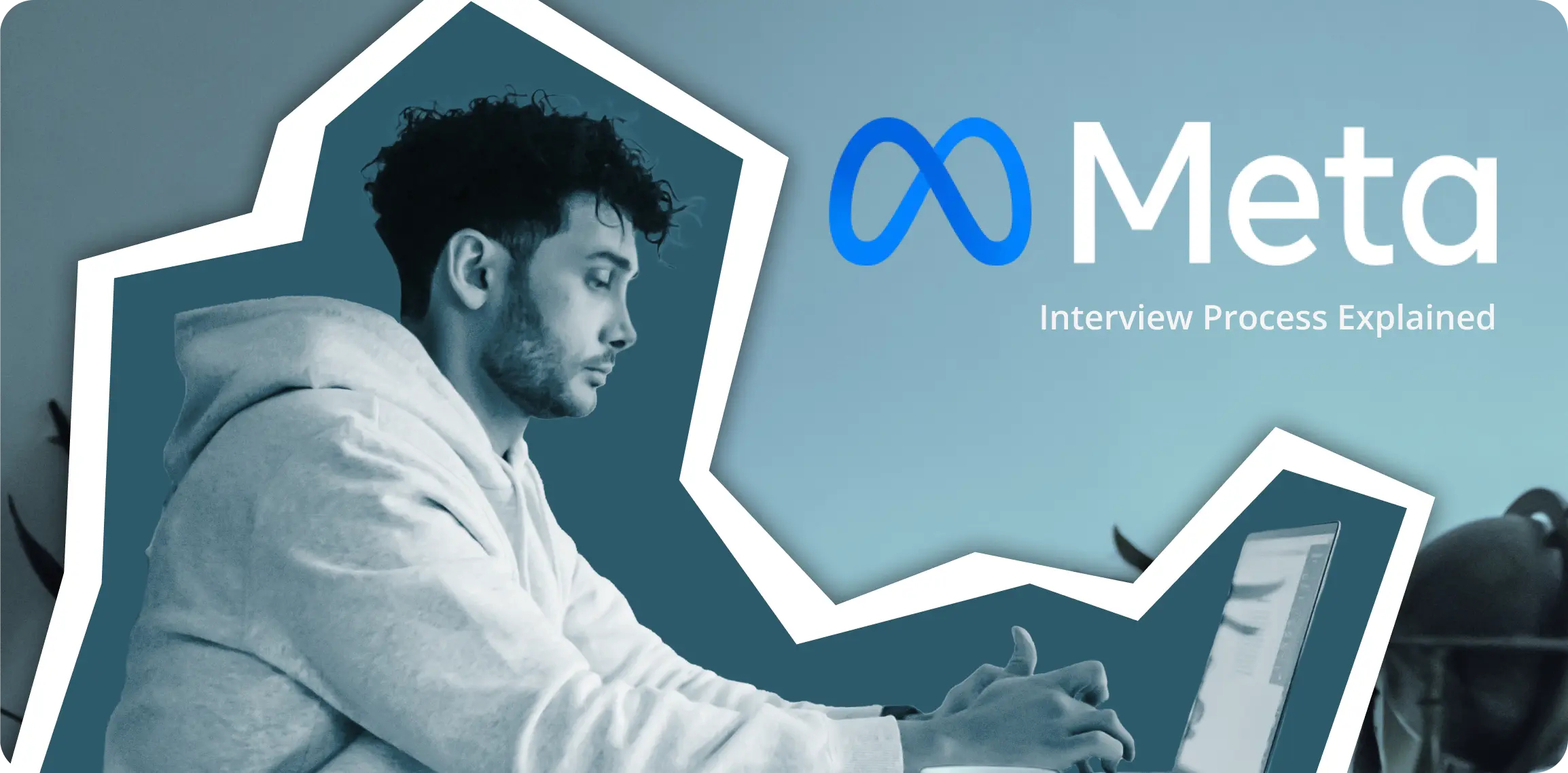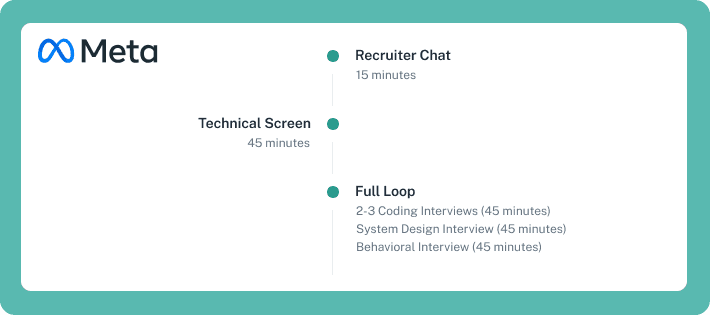SWE Interviews at Meta Explained by Former Meta Interviewer
By Evan King
The Timeline: Know What to Expect 🤔
- Resume Screening:
- Purpose: To evaluate if your skills and experiences align with the job requirements.
- Process: Your application and resume are reviewed, focusing on relevant skills, experiences, and notable projects or roles.
- Note: If your application comes through a referral, it may receive additional attention or priority during this phase.
- Recruiter Call (15 Minutes):
- Purpose: To provide an initial interaction and share information about the upcoming steps in the interview process.
- Process: If your resume is selected, you will have a 15-minute call with a recruiter. This call is informational and is not an evaluation of your skills.
- Note: You can use this opportunity to ask preliminary questions about the role or team.
- Technical Screen (45 Minutes):
- Purpose: To assess your technical skills and problem-solving abilities.
- Process: The technical screen takes 45 minutes and will typically involve solving 1-2 technical problems (often from platforms like LeetCode) that assess your coding and problem-solving skills.
- Note: The difficulty of the questions can vary, and it may involve either two questions of varying difficulty or a single, more complex question.
- The Full Loop:
- Purpose: To conduct a comprehensive evaluation of your technical and interpersonal skills.
- Process:
- Coding Interviews: You will undergo two or three additional coding interviews similar to the technical screen.
- System Design Interview: Applicable for candidates applying for E4 level positions or above.
- Behavioral Interview: This section evaluates your interpersonal skills and examines how you've navigated team environments and conflict resolution in the past.
Recruiter Chat (15 minutes) 💬
- Purpose: The recruiter is not evaluating your technical skills here. Rather, they are ensuring you understand the role and providing you with a clear picture of the upcoming steps in the process.
- Your Role: While it's not an evaluation, make sure to listen attentively and ask any preliminary questions you might have regarding the role or the subsequent interview stages. Express your enthusiasm for the position and ensure to convey any important information about your availability and timelines.
- Next Steps: At the end of the call, the recruiter will work with you to schedule the Technical Screen and provide additional resources that might help you prepare for the upcoming technical evaluations.
Technical Screen (45 minutes) 🧑💻
What to Expect
Evaluation Criteria
- Problem Solving:
- Your ability to parse, understand, and articulate complex ideas is central here.
- Are you elucidating the rationale behind a proposed solution?
- Can you develop and weigh different solutions, employ apt data structures, and discuss space and time complexity?
- Your skill in refining and optimizing solutions will also be under the lens.
- Coding:
- Can you translate theoretical solutions into executable code fluently?
- The clarity, organization, and logical structuring of your code will be evaluated.
- Verification:
- Are you contemplating various test cases or providing solid justifications for your code's correctness?
- Your aptitude for navigating through your logic to identify, understand, and resolve bugs is vital.
- Communication:
- Are you proactively seeking clarity and requirements before delving into coding?
- Remember, this should be a dialogic process. Engage in a conversation with the interviewer, articulating your thoughts clearly and being receptive to cues or feedback.
The On-site (or full loop) 🔁
Coding Interviews (2-3 sessions, 45 minutes each)
What to Expect
Evaluation Criteria:
- Problem Solving: Comprehensive understanding, multi-solution development, and optimal solution derivation.
- Coding: Fluent and logical conversion of solutions into executable code.
- Verification: Thorough code verification through varied test cases or logical justification.
- Communication: Active dialogue, clear articulation of thought processes, and receptivity to feedback and cues.
System Design Interview (1 session, 45 minutes for E4+)
What to Expect
- In-depth Discussions: Delve deep into technical discussions concerning product ideas, scalability, data structures, technologies utilized, and the comprehensive aspects of building a software solution.
- Varying Scopes: The span of questions may vary widely, from system and product to front-end focused problems that necessitate connecting multiple concepts seamlessly.
- No Single "Right" Answer: System design problems are notorious for their open-ended nature, inviting a spectrum of potential solutions.
- Designing a music streaming service like Spotify
- Building a Facebook chat
- Architecting a global video distribution system
Evaluation Criteria
- Problem Navigation:
- Organize the problem space, constraints, and potential solutions meticulously.
- Engage in reducing ambiguity, identifying pivotal problems, and defining a design-oriented requirement set through your queries.
- Solution Design:
- Design a workable solution, either addressing the entire problem or parts of it, while maintaining a panoramic view of the overarching problem.
- Technical Excellence:
- Dive into technical details as needed and articulate dependencies and trade-offs proficiently.
- How are you safeguarding against potential risks and failure points?
- Technical Communication:
- Ensure your visions and technical ideas are communicated with clarity and coherence.
- Actively understand and address feedback provided during the interview.
Behavioral Interview (1 session, 45 minutes)
What to Expect
- Inquisitive Deep Dive: Expect the interviewer to delve into your background, discerning what ignites your passion in tech, and understanding the kind of impact you aim to create.
- Expansive Questions: Be ready to traverse through various aspects of your past and current projects, discussing specific scenarios, impacts, and gleaned learnings.
- Tales of Growth and Conflict: You'll likely be asked to narrate instances of conflicts and your journey of continual professional and personal growth.
- Disagreements with colleagues or managers and your resolution tactics.
- Scenarios where you sought out growth opportunities or tackled constructive criticism.
- Instances where ambiguity was embraced and navigated through.
Evaluation Criteria
- Resolving Conflict:
- Your history of disagreements and resolutions.
- Your capacity to empathize with divergent viewpoints.
- Growing Continuously:
- Your propensity for identifying and seizing growth and learning opportunities.
- Your receptiveness and action towards constructive criticism.
- Embracing Ambiguity:
- Your operational strategy within ambiguous and swiftly altering environments.
- Your decision-making and productivity maintenance amidst information scarcity.
- Driving Results:
- Your experience and strategy in propelling yourself and others towards goal attainment.
- Demonstrating your impact and maneuvering through challenges and obstacles.
- Communicating Effectively:
- Your communicative adaptability with teams and cross-functional partners.
- Your strategy for tailoring communications contingent on the work and audience.
Getting Prepared
Mark as read
About The Author
Evan, Co-founder of Hello Interview and former Staff engineer at Meta, possesses a unique vantage point having been on both sides of the tech hiring process. With a track record of conducting hundreds of interviews and securing offers from top tech companies himself, he is now on a mission to help others do the same.
Recommended Reading
Comments
On This Page
The Timeline: Know What to Expect 🤔
Recruiter Chat (15 minutes) 💬
Technical Screen (45 minutes) 🧑💻
What to Expect
Evaluation Criteria
The On-site (or full loop) 🔁
Coding Interviews (2-3 sessions, 45 minutes each)
System Design Interview (1 session, 45 minutes for E4+)
Behavioral Interview (1 session, 45 minutes)
Getting Prepared
Schedule a mock interview
Meet with a FAANG senior+ engineer or manager and learn exactly what it takes to get the job.




Your account is free and you can post anonymously if you choose.